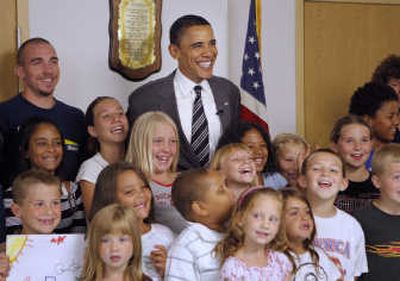Obama embraces federally funded religious charities

ZANESVILLE, Ohio – Barack Obama pledged Tuesday to expand a controversial White House program that funnels federal money to religious charities, embracing a core piece of President Bush’s legacy as he tries to win over Republican-leaning evangelical voters.
The presumptive Democratic presidential nominee said he would make it easier for churches and small community groups to receive federal grants, and pledged to spend $500 million to help schools and churches run summer reading programs.
Obama delivered his speech at the Eastside Community Ministry in this key battleground state, home to many of the religious voters who backed Bush, in part because of his faith-based initiative. With his proposal, the Illinois senator embraced a theme that has been closely associated with Republicans – and one that has drawn scorn from many Democrats and civil liberties groups who believe it infringes church-state separation.
“I know there are some who bristle at the notion that faith has a place in the public square,” Obama said. “But the fact is, leaders in both parties have recognized the value of a partnership between the White House and faith-based groups.”
Obama, who worked for a Catholic group as a community organizer in Chicago in the early 1980s, added that the “challenges we face today – from saving our planet to ending poverty – are simply too big for government to solve alone.”
Still, mollifying some critics in his party, Obama distanced himself from some of the more controversial aspects of the Bush program.
He signaled he would not fund church groups that make hiring decisions based on an applicant’s religion and would make sure federal money was not used to proselytize.
He also echoed critiques from two ex-officials of Bush’s Office of Faith-Based and Community Services who had charged that it was exploited for partisan purposes – to build GOP support in battleground states – and served as a convenient “photo op.”
Obama argued that Bush’s office “never fulfilled its promise.” He said he would rename the initiative and ensure that small organizations are not short-changed.
Both ex-officials – former director John DiIulio and deputy director David Kuo – advised Obama on his plan, and both praised it Tuesday. But another former director, Jim Towey, dismissed Obama’s criticisms – and added that Obama might not be immune to charges of political posturing on the issue.
“It could be argued that his speech was a photo op on faith,” he said. “I’m not going to judge his motive, but he has to be careful making those kinds of accusations.”
And Obama took criticism from some unusual quarters: liberal groups that had hoped a Democratic administration would curtail the government’s engagement with religious charities.
People for the American Way greeted with alarm Obama’s proposal to send federal money to churches, saying it is a “bad idea” and a “tricky business.”
“It would create both a constitutional problem and logistical mess,” the group’s president, Kathryn Kolbert, said in a statement, “pitting oversight and accountability for public funds against the autonomy of churches, synagogues, and mosques.”
Obama’s speech comes as his campaign and its supporters launch what many Democrats say is the most aggressive outreach to religious voters ever by the party’s presidential nominee.
In giving Obama another chance to remind voters of his Christianity, Tuesday’s announcement carried an added political benefit for a candidate whose religious affiliation has been the subject of rumor and controversy. He quit his Chicago church after his longtime pastor made explosive comments, and has tried to quash false reports that he is a Muslim.
Still, Obama’s announcement marked a pivotal moment in the Democratic Party’s stance on faith. While other Democratic presidential candidates, such as Bill Clinton and Al Gore, have also embraced federal funding for faith-based charities, congressional Democrats have led the charge against Bush’s initiative.
The Bush White House used the program, and Democratic opposition, to build alliances with influential pastors – particularly in black and Latino communities – some of whom would later campaign for the president’s re-election. Bush often mentioned the initiative in speeches to religious groups, and the White House often hosted events in battleground states.
Some Democratic strategists now believe their party’s opposition to Bush’s initiative helped the Republicans paint Democratic candidates as hostile to faith and some Democrats have pushed party leaders to be more welcoming to evangelical voters.
“He’s definitely taking on the secular wing of his own party,” Kuo said. “If the old stereotype was that Republicans don’t care about the poor and Democrats don’t care about faith, Obama is saying, yes Democrats care about faith.”
Aides to McCain did not respond Tuesday to questions about Obama’s proposal.
The Arizona senator, who has struggled to win over skeptical evangelical voters, has expressed lukewarm support for maintaining Bush’s policies.
“There’s many examples of where faith-based organizations have been very successful,” McCain said in an April interview, noting that he had been impressed by the response of religious groups to Hurricane Katrina. “There are times when they haven’t – so you learn the lessons. But I think the overall experiment is probably been good for America.”